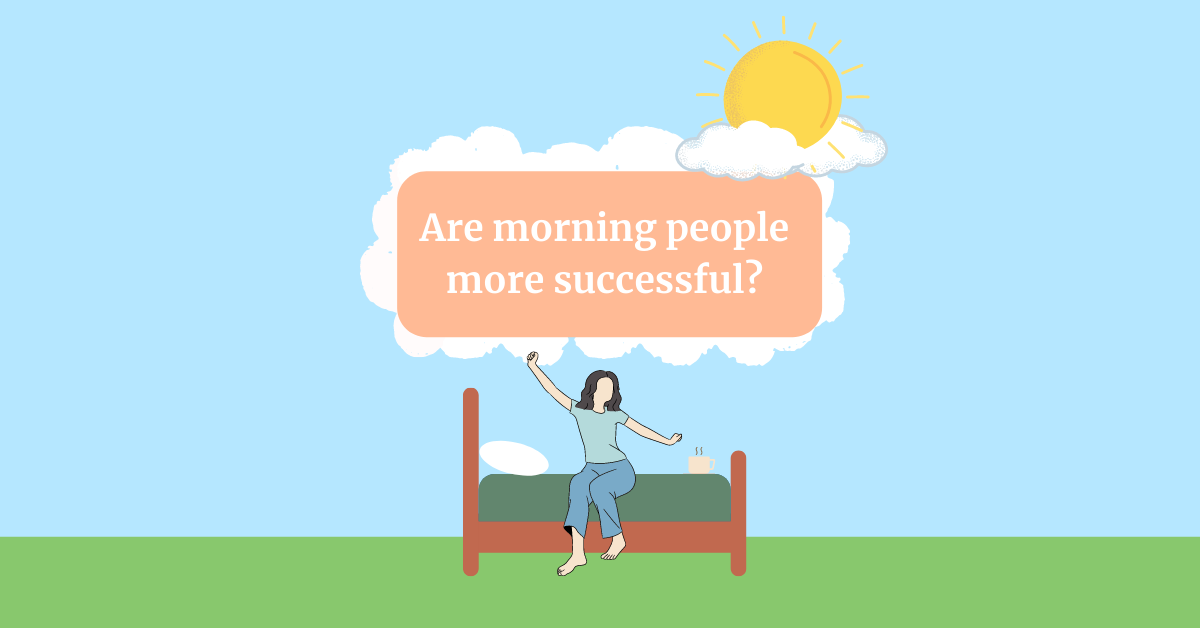We have all seen the successful morning routine videos. The internet is filled with them.
“Successful people wake up at 5am”, “Number 1 Tip For Success- My 5am early morning routine.” Successfulness is, of course, highly subjective. It is defined online as, “the accomplishment of an aim or purpose.” For one person, that may be climbing the corporate ladder. For the next, it may be remaining mindful and self-aware throughout their day. Success looks completely different from person to person.
These 5am-ers claim to have it sussed. Just get up early and you’ll be successful. However, as a night owl, I believe we get the short end of the stick. We are labelled as ‘lazy, messy, unsuccessful’ beings who love to stay up late and thrive at their failures. Well, I am sick of this rhetoric. I decided to undertake some research, questioning this ‘waking up at 5am’ trend.
I want to find out if getting up early correlates with success and what this means for night owls.
Why morning people may be more successful
A survey was conducted by biologist, Christoph Randler. He asked 367 university students what time of day they were most energetic and how proactive they were. He found that morning people were indeed more proactive in tackling their challenges before the day began. This particular study showed that morning people began their day with a more productive start.
These were the reasons why:
- They’re proactive in setting an agenda for the day,
- More productive- can gain a competitive advantage at the start of the day,
- Less stressed in the mornings, as they’ve more time,
- They have more energy in the morning,
- Fewer distractions,
- They’re awake before others- no interruptions,
- Can work on their own personal projects,
- More likely to exercise, meditate, or read in the morning- leading to a more successful mood for the day.
Those morning people are probably not rushing out the door and forgetting their keys, which is something we night owls may be prone to doing. Nothing like starting off the day with a big ball of stress. Ah yes. Wonderful. After reading the studies surrounding this, I can see how having extra time in the morning may make someone more successful, but only if they use this time for their personal benefit.
What does this mean for night owls?

If we can’t wake up at the crack of dawn, does this mean we’re bound to be unsuccessful? Is it because we are naturally very lazy? (My friends and family can avoid answering. That was a rhetorical question).
No- we aren’t lazy. It’s to do with our circadian rhythm.
Genetics Play a Part
What many of these night-owl-shaming online articles fail to mention, is that our biorhythms are largely out of our control. Some people are programmed to wake up cheerful and productive, others aren’t.
A circadian rhythm is a natural, internal process that regulates the sleep–wake cycle and repeats roughly every 24 hours. Therefore, being a night owl or early bird depends on your sleep chronotype. According to Michael J. Breus, clinical psychologist, the ‘rise early for successfulness’ has an easy catchline, but it doesn’t work for everyone.
Think of when you naturally become tired. For me, that’s 1am. For others, it’s 9pm. This is your natural circadian rhythm, and although you can change your body clock easily by an hour each way, changing it drastically isn’t always the most productive for you. Many evolutionary biologists believe that communities with more variation in sleep chronotypes were more likely to survive. Members of the tribe that were awake, would have protected those who were resting. Hence, the differing times for sleeping between individuals.
So perhaps, if we can understand our sleep chronotype and natural circadian rhythm, we can choose our most productive hours based on our personality? Then- surely, this will lead to our individual success.
See below, the 4 different types of sleepers.
Therefore, can night owls be successful too?
Yes, of course, they can. Studies show that night owls tend to be more creative than morning types, may have a better sense of humor, and are more outgoing. However, they’re out of sync with the typical corporate schedule. With this in mind, they can get left behind if the corporate schedule doesn’t sync with their sleeping patterns.
Here are a few examples of successful night owls:
- Buzzfeed CEO and Huffington Post co-founder Jonah Peretti- gets up at 8.30am,
- Reddit co-founder Alexis Ohanian- stays up late and gets up at 10am,
- Facebook founder Mark Zuckerberg claimed he was never a morning person.
I think this has given hope that being productive within the hours you’re up for the day is probably the most important. It depends on the person. Whether that’s the morning, afternoon, or evening, it’s up to you to find out when you work best.
In conclusion
No, morning people are not always more successful. Waking up at 5am won’t automatically make you successful. Getting up at a time that works for you, will. Identifying your most productive hours and using techniques that will help you achieve your individual success will be most beneficial for you.
But before I go, here are my questions for morning people. The 5am-ers…
- If you get up at 5am, are you not falling asleep by dinner time?
- Are your eating habits earlier than everyone else’s? For example, breakfast at 6am, lunch at 11am, dinner at 3pm?
- How do you ever go out for the night? Are you not asleep after one drink and home by 11 at the latest?
- What do you do at 5am, that can’t be done at a normal time?
- How is it physically possible to have the motivation to get up at that hour?
Of course, I am secretly a bit jealous that it takes all of my strength to throw myself out of bed at 8am. I can understand how peaceful the morning must be for people, but my burning eyes and night owl personality will probably never let me experience the 5am hype.
So, the next time you see that “5am Morning Routine” and feel saddened that you will never be that person, don’t blame yourself. Blame your genetics.
Chat soon,
Eilís x





